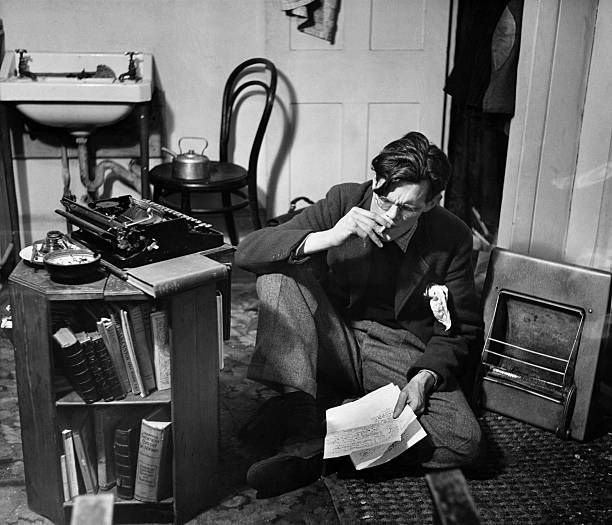Of as good blood as any in England
But he was wall-eyed and his legs too spare.
Amongst
the more learned persons of his time
Having
had his schooling in the University of OxfordIn Anglo-Saxon Latin ornithology and crime
Yet after four years he was finally not preferred.
In
his youth he would compose poems in prose and verse
In
a classical romantic manner which was pastoralTo which the best judges of the Age were not averse
And the public also but his profit was not financial.
Now
having outlived his friends and most of his reputation
He
is content to take his rest under these stones and grassNot expecting but hoping that the Resurrection
Will not catch him unawares whenever it takes place.
John Heath Stubbs - Epitaph
Born
on 09 July 1918 in London, the poet John Heath-Stubbs died on Boxing Day 2006,
aged 88 at his flat in Bayswater. The Church Times reported that his parish
priest (from St Matthews in St. Petersburgh Place) brought him communion the day before his
death (on Christmas Day?) and reported “that the poet’s mind was undimmed, and
he was still giving out erudition.” Sadly his poem ‘Epitaph’ was not used as
the actual epitaph on his slickly polished marble headstone in Kensal Green
Cemetery.
 |
| The tall, gangly youth with extreme short sight, peering into a book (or a manuscript...whilst smoking a cigarette) |
He
suffered from problems with his eyes from the age of 3 and after a lifetime of
gradually deteriorating eyesight became completely blind just before he reached
his 60th birthday. As a teenager his vision was poor enough for him to be
sent to Worcester College for the Blind. Despite his disability he was a
brilliant scholar, a polymath and an expert of The Golden Bough; he graduated
at Queens College Oxford. His obituary in
the Independent says he was “then a tall, gangly youth with extreme short
sight, peering into books. Friends found the sight of him in summer, holding on
to the riverbank while his punt moved slowly but surely downstream,
transforming him from an arch into a splash, unforgettably funny. Little by
little he became completely blind, so that if he was reciting his poems to an
audience he might by misjudgement turn and address them to the wall.”
Heath-Stubbs
was that very rare thing, a professional poet. Most of his income may have come
from his academic posts but these were almost all granted to him because of his
status as a poet. In the Guardian Jonathan Fryer wrote:
Though curious to discover new
ideas, he was not a good listener and could be unbridled when his hackles were
raised. He sometimes lost his temper even with close friends, though he would
usually ring them the following morning to apologise.
John could be found in many of
Soho's notorious drinking-holes in the 1950s and 1960s, and his own little
basement flat in west London was a model of bohemian squalor. Fiercely
independent, he lived on his own and insisted on cooking for his guests - surprisingly
well, though both the floor and the ceiling showed evidence of mishaps. |
| On the verge of total blindness - Heath-Stubbs in 1978 by Nigel Foxell |
Some
of his poetry is astoundingly beautiful, as in these lines about the swift;
There is no creature (except,
perhaps,The angel) so wholly native to
The upper air. His tiny feet
Cannot walk on ground, can cling only.
The wisps and straws he needs to build his nest
He snatches in mid-air. He even sleeps
Borne up by the rising thermals.
This black screamer, rushing at evening
Above our cities, is kin
To the tropical humming-bird, who can fly backwards
Out of the great flower-bells
In the Amazonian forest.

I knew John well. He came to our local in Fitness. Seeing him engaged with the deaf South African poet David Wright, was wonder to behold . John could hear but not see, David could see but not hear, so he lip read. I have some photos but not sure how to download them here. Fiona Green
ReplyDeletemarried to poetry publisher Martin Green. fionaskene@hotmail.com
This should say “ our local in Fitzrovia’
Delete